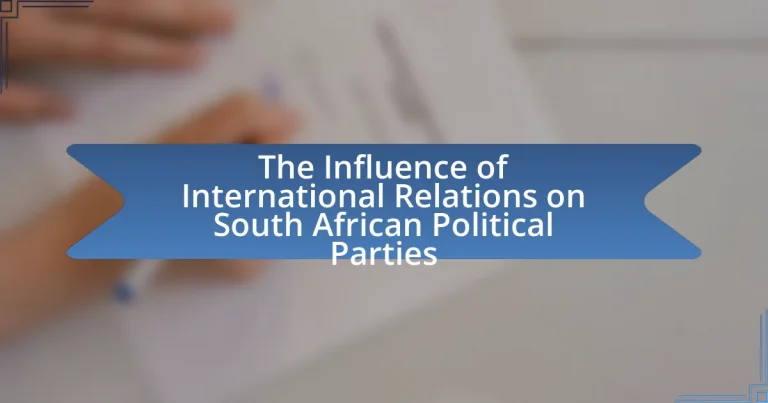The article examines the significant influence of international relations on South African political parties, focusing on how foreign policy shapes party policies, alliances, and electoral strategies. It highlights the role of key international relationships, such as those with the United States, China, and the African Union, in shaping domestic political dynamics and party platforms. The discussion includes the impact of global political trends on local party strategies, the importance of understanding international relations for political parties, and how international agreements affect policy-making. Additionally, it explores the positions of major political parties, including the African National Congress, the Democratic Alliance, and smaller parties, in relation to their international engagements and the challenges they face in navigating the global political landscape.
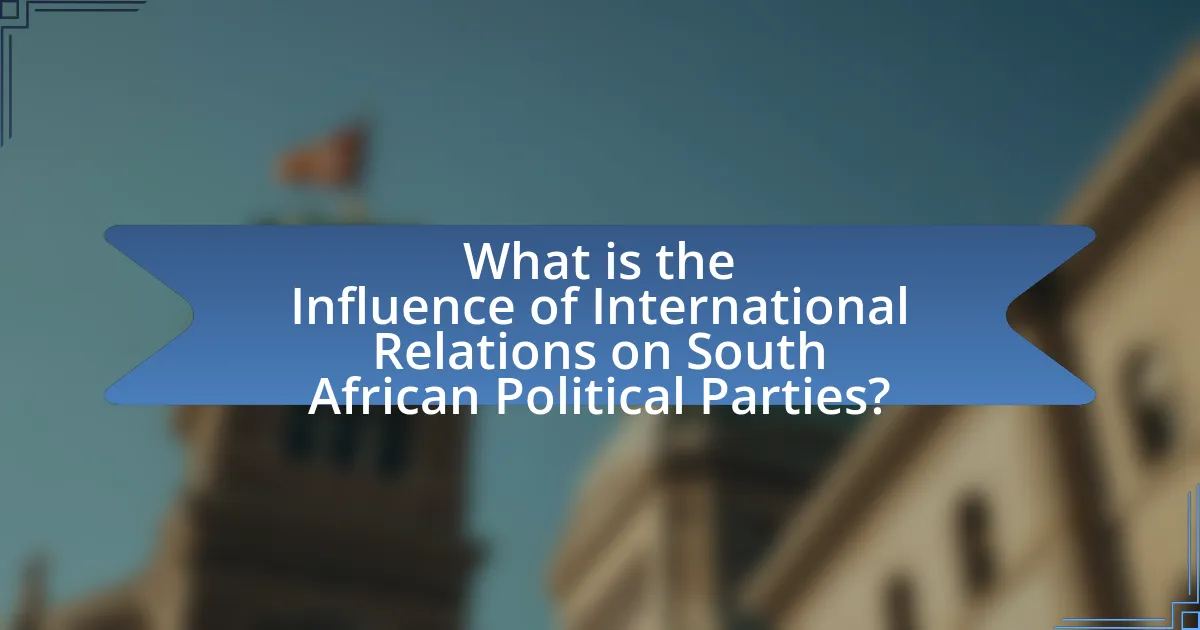
What is the Influence of International Relations on South African Political Parties?
International relations significantly influence South African political parties by shaping their policies, alliances, and electoral strategies. The country’s foreign policy, particularly its stance on issues like human rights, trade, and regional stability, directly impacts party platforms and voter perceptions. For instance, the African National Congress (ANC) has historically aligned itself with liberation movements across Africa, reflecting its international solidarity stance, while opposition parties often critique the government’s foreign engagements to appeal to nationalist sentiments. Additionally, South Africa’s membership in international organizations, such as the African Union and BRICS, informs party positions on global economic and political issues, influencing their domestic agendas and electoral outcomes.
How do international relations shape the political landscape in South Africa?
International relations significantly shape the political landscape in South Africa by influencing policy decisions, party alignments, and diplomatic strategies. The country’s historical context, particularly its transition from apartheid, has led to a focus on multilateralism and regional cooperation, as seen in its active participation in organizations like the African Union and BRICS. These international affiliations impact domestic politics by fostering alliances that align with global economic and political trends, such as trade agreements and foreign investment initiatives. For instance, South Africa’s trade relations with China have bolstered economic growth, which in turn affects political stability and party dynamics, as parties leverage economic performance to gain electoral support.
What are the key international relationships that impact South African politics?
Key international relationships that impact South African politics include those with the United States, China, and the African Union. The United States influences South Africa through trade agreements and diplomatic ties, particularly in areas like security and economic development. China plays a significant role as a major trading partner and investor, with bilateral trade reaching over $40 billion in 2021, affecting South Africa’s economic policies. The African Union, headquartered in Addis Ababa, Ethiopia, shapes South African politics through regional cooperation and peacekeeping initiatives, reinforcing South Africa’s leadership role in continental affairs. These relationships collectively shape South Africa’s foreign policy and domestic political landscape.
How do global political trends influence local party dynamics?
Global political trends significantly influence local party dynamics by shaping ideological alignments, electoral strategies, and policy priorities. For instance, the rise of populism in various countries has prompted South African political parties to adopt more populist rhetoric and policies to resonate with voters. Additionally, international economic shifts, such as trade agreements or sanctions, can compel local parties to adjust their economic policies to align with global market trends. The impact of global climate change discussions has also led parties to prioritize environmental issues in their platforms, reflecting a broader global concern. These adaptations demonstrate how local party dynamics are responsive to the changing landscape of international politics, as evidenced by the increased focus on social justice and economic inequality in South African political discourse, mirroring global movements.
Why is understanding international relations important for South African political parties?
Understanding international relations is crucial for South African political parties because it shapes their foreign policy, economic strategies, and diplomatic engagements. Political parties must navigate a complex global landscape where international alliances, trade agreements, and geopolitical dynamics directly impact national interests. For instance, South Africa’s participation in BRICS (Brazil, Russia, India, China, and South Africa) highlights the importance of understanding global partnerships to enhance economic growth and political influence. Additionally, awareness of international relations allows parties to address global issues such as climate change and human rights, which resonate with both domestic and international constituents.
What role does international diplomacy play in party strategies?
International diplomacy significantly shapes party strategies by influencing policy positions, electoral tactics, and coalition-building efforts. Political parties in South Africa often align their platforms with international norms and expectations to gain legitimacy and support, particularly in a globalized context where foreign relations impact domestic issues. For instance, the African National Congress (ANC) has historically leveraged international diplomacy to bolster its anti-apartheid stance, gaining support from global allies, which in turn strengthened its political strategy and electoral appeal. Additionally, parties may adjust their foreign policy positions based on international diplomatic trends, such as trade agreements or geopolitical alliances, to resonate with voter concerns and enhance their competitive edge in elections.
How do international agreements affect party policies?
International agreements significantly shape party policies by establishing frameworks that parties must navigate to align with global standards and commitments. For instance, South Africa’s adherence to international treaties, such as the Paris Agreement on climate change, compels political parties to incorporate environmental sustainability into their platforms. This alignment is evident in the policies of the African National Congress, which has integrated climate action into its national development plans, reflecting the influence of international commitments on domestic policy formulation. Additionally, trade agreements, like the African Continental Free Trade Area, drive parties to adopt economic policies that promote regional integration and competitiveness, thereby influencing their electoral strategies and legislative priorities.
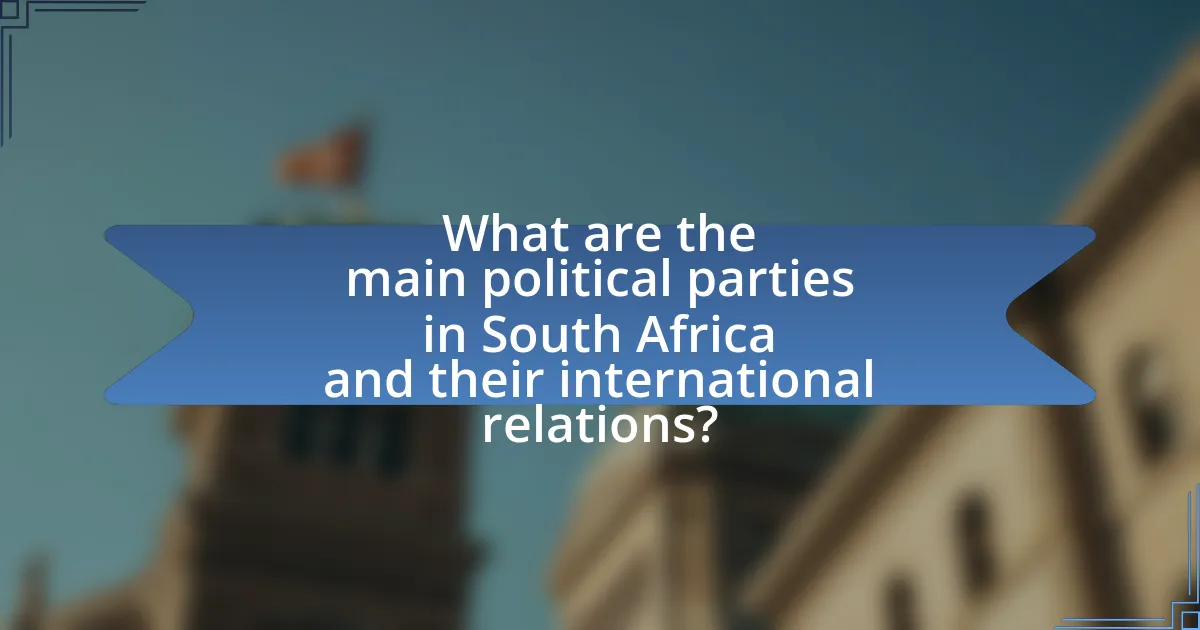
What are the main political parties in South Africa and their international relations?
The main political parties in South Africa are the African National Congress (ANC), the Democratic Alliance (DA), and the Economic Freedom Fighters (EFF). The ANC, as the ruling party since the end of apartheid in 1994, maintains strong ties with other liberation movements and socialist governments, particularly in Africa and the BRICS nations, promoting solidarity and economic cooperation. The DA, as the main opposition party, focuses on liberal democratic values and has established relationships with international liberal parties, advocating for human rights and economic reforms. The EFF, a leftist party, seeks to align with anti-imperialist movements and has expressed solidarity with countries facing economic challenges due to Western policies. These parties’ international relations reflect their ideological stances and influence their domestic policies and electoral strategies.
How do the African National Congress (ANC) engage with international partners?
The African National Congress (ANC) engages with international partners through diplomatic relations, participation in global forums, and collaboration with international organizations. The ANC actively seeks partnerships to promote its political agenda, enhance economic ties, and address global issues such as human rights and climate change. For instance, the ANC has historically aligned with socialist and progressive movements worldwide, fostering relationships with parties like the Communist Party of China and the Socialist International. Additionally, the ANC’s involvement in the African Union and the United Nations demonstrates its commitment to multilateralism and regional cooperation, further solidifying its international presence and influence.
What international alliances does the ANC prioritize?
The African National Congress (ANC) prioritizes alliances with the African Union (AU), the Southern African Development Community (SADC), and the Non-Aligned Movement (NAM). These alliances are crucial for the ANC as they enhance regional cooperation, promote economic development, and support political solidarity among member states. The ANC’s commitment to these alliances is evidenced by its active participation in AU summits and SADC initiatives, which aim to address issues such as peace, security, and socio-economic development in Africa.
How has the ANC’s foreign policy evolved over time?
The African National Congress’s (ANC) foreign policy has evolved from a focus on anti-colonialism and liberation support during the apartheid era to prioritizing economic diplomacy and regional stability in the post-apartheid period. Initially, the ANC sought international support to combat apartheid, aligning with other liberation movements and gaining backing from countries like the Soviet Union and Cuba. After 1994, the ANC shifted its approach to emphasize trade relations, investment, and multilateralism, as evidenced by its participation in forums such as the African Union and BRICS. This transition reflects a broader strategy to enhance South Africa’s global standing and foster economic growth, demonstrating a pragmatic adaptation to changing international dynamics.
What is the stance of the Democratic Alliance (DA) on international relations?
The Democratic Alliance (DA) advocates for a foreign policy that emphasizes human rights, democracy, and economic partnerships. The DA supports strengthening ties with Western nations and prioritizes trade agreements that benefit South Africa’s economy. This stance is rooted in their belief that international relations should promote democratic values and economic growth, as evidenced by their criticism of the South African government’s alignment with authoritarian regimes.
How does the DA’s approach differ from that of the ANC?
The Democratic Alliance (DA) emphasizes a liberal, market-oriented approach focused on economic growth and individual freedoms, while the African National Congress (ANC) adopts a more interventionist stance, prioritizing social equity and state-led development. The DA advocates for policies that promote private enterprise and reduce government involvement in the economy, as evidenced by their support for tax cuts and deregulation. In contrast, the ANC’s policies often include land reform and increased public spending on social services, reflecting its commitment to addressing historical inequalities. This fundamental difference in economic philosophy shapes their respective international relations strategies, with the DA seeking partnerships that enhance trade and investment, while the ANC often aligns with nations that share its developmental agenda.
What international partnerships does the DA seek to establish?
The Democratic Alliance (DA) seeks to establish international partnerships primarily with liberal and democratic political parties globally. These partnerships aim to enhance collaboration on governance, human rights, and economic development. The DA has historically engaged with organizations such as the International Democratic Union and the Alliance of Liberals and Democrats for Europe, which provide platforms for sharing best practices and strategies in promoting democratic values. This focus on aligning with like-minded parties underscores the DA’s commitment to fostering a network that supports democratic governance and accountability in South Africa and beyond.
How do smaller parties in South Africa view international relations?
Smaller parties in South Africa generally view international relations as a critical component of national policy that influences economic development, human rights, and global cooperation. These parties often advocate for a foreign policy that prioritizes social justice, equitable trade, and regional stability, reflecting their commitment to addressing domestic inequalities through international partnerships. For instance, the Economic Freedom Fighters emphasize the need for international solidarity in combating colonialism and imperialism, while the Democratic Alliance focuses on promoting democratic values and human rights on a global scale. Their perspectives are shaped by the belief that effective international relations can enhance South Africa’s standing in global affairs and contribute to the well-being of its citizens.
What unique perspectives do these parties bring to international issues?
South African political parties bring diverse perspectives to international issues shaped by their historical contexts, ideologies, and constituencies. The African National Congress (ANC) emphasizes anti-colonialism and solidarity with other developing nations, advocating for a multipolar world to counter Western dominance. The Democratic Alliance (DA) focuses on liberal democracy and economic growth, promoting free trade and investment as pathways to development. The Economic Freedom Fighters (EFF) challenge global capitalism, advocating for land redistribution and wealth equity, which they argue are essential for addressing historical injustices. Each party’s stance reflects its foundational principles and the socio-economic realities of South Africa, influencing its approach to international relations.
How do smaller parties leverage international relations for political gain?
Smaller parties leverage international relations for political gain by forming strategic alliances with foreign entities and utilizing international platforms to amplify their voices. For instance, these parties often engage with international organizations, such as the United Nations or regional bodies, to gain legitimacy and support for their agendas. This approach can attract attention to local issues on a global stage, thereby increasing their influence domestically. Additionally, smaller parties may align themselves with international movements or ideologies that resonate with their constituents, enhancing their appeal and credibility. Historical examples include the African National Congress’s (ANC) collaboration with international anti-apartheid movements, which helped garner global support and pressure for change in South Africa.
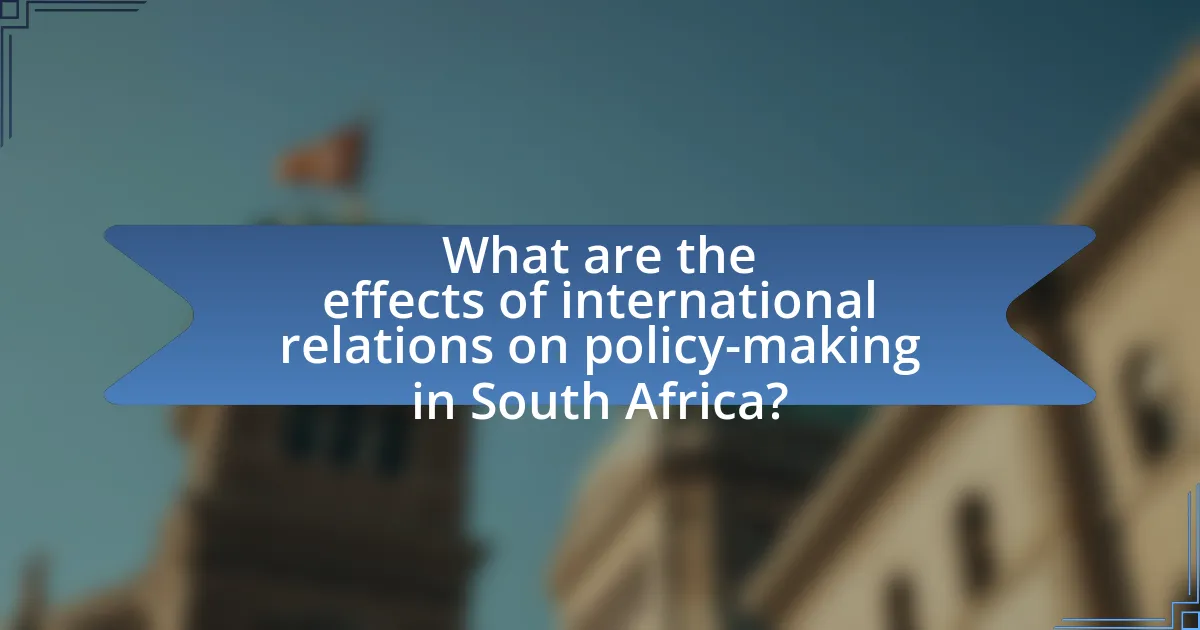
What are the effects of international relations on policy-making in South Africa?
International relations significantly influence policy-making in South Africa by shaping diplomatic strategies, economic partnerships, and security frameworks. The country’s foreign policy is often aligned with global trends, such as its commitment to multilateralism and regional integration, which are evident in its active participation in organizations like the African Union and the United Nations. For instance, South Africa’s foreign policy decisions regarding trade agreements, such as the African Continental Free Trade Area, reflect its engagement with international economic dynamics. Additionally, international relations impact domestic policies, as seen in the government’s response to global issues like climate change, which has led to the adoption of policies aimed at sustainable development. These effects demonstrate how South Africa’s policy-making is intertwined with its international relations, influencing both its domestic agenda and its role on the global stage.
How do international economic relations influence domestic policies?
International economic relations significantly influence domestic policies by shaping trade agreements, investment flows, and regulatory frameworks. For instance, South Africa’s participation in the BRICS group has led to policy adjustments aimed at enhancing trade with emerging economies, which in turn affects local industries and employment. Additionally, international economic pressures, such as those from the International Monetary Fund, often compel governments to adopt austerity measures or structural reforms, directly impacting social welfare policies. These dynamics illustrate how global economic interactions can dictate domestic policy choices, aligning them with international standards and expectations.
What economic agreements impact South African political party agendas?
Economic agreements that impact South African political party agendas include the African Continental Free Trade Area (AfCFTA), the Southern African Development Community (SADC) Trade Protocol, and various bilateral trade agreements. The AfCFTA, which aims to create a single market for goods and services across Africa, influences political parties to prioritize regional integration and economic cooperation in their platforms. The SADC Trade Protocol facilitates trade among member states, prompting parties to advocate for policies that enhance intra-regional trade. Additionally, bilateral agreements with countries like the United States and the European Union shape party agendas by encouraging trade relations and investment, compelling parties to align their economic policies with international trade standards and practices.
How do trade relations shape party platforms?
Trade relations significantly shape party platforms by influencing economic policies and priorities. Political parties often align their platforms with the interests of key trading partners to promote economic growth and job creation. For instance, in South Africa, the African National Congress (ANC) has historically supported trade agreements that enhance relations with countries like China and the European Union, reflecting a commitment to economic development and globalization. This alignment is evident in the ANC’s focus on attracting foreign investment and fostering export-led growth, which are critical for the country’s economic strategy. Additionally, trade relations can lead to shifts in party platforms as parties respond to public sentiment regarding trade impacts, such as job losses in certain sectors, prompting them to advocate for protective measures or trade reforms.
What social issues are influenced by international relations in South Africa?
International relations in South Africa significantly influence social issues such as poverty, inequality, and access to education. The country’s foreign policy decisions, shaped by its relationships with other nations, impact economic aid and trade agreements, which in turn affect domestic social conditions. For instance, South Africa’s participation in BRICS (Brazil, Russia, India, China, and South Africa) has led to increased investment and trade opportunities, contributing to job creation and economic growth. However, disparities remain, as the benefits of international relations are not evenly distributed, often exacerbating existing inequalities within the population.
How do global human rights standards affect local party policies?
Global human rights standards significantly influence local party policies by establishing benchmarks that parties must adhere to in order to gain legitimacy and support. These standards, often articulated through international treaties and agreements, compel local parties to align their policies with universal human rights principles, such as equality, non-discrimination, and freedom of expression. For instance, South African political parties are influenced by the country’s commitment to the Universal Declaration of Human Rights and the African Charter on Human and Peoples’ Rights, which shape their platforms and legislative agendas. This alignment is crucial for parties seeking international recognition and funding, as non-compliance can lead to diplomatic isolation and economic sanctions.
What role does international aid play in shaping party priorities?
International aid significantly influences party priorities by providing financial resources that can shape policy agendas and electoral strategies. For instance, South African political parties often align their priorities with the interests of international donors, which can lead to a focus on issues such as poverty alleviation, health care, and education reform. Research indicates that parties receiving substantial foreign aid may prioritize policies that align with donor expectations to secure continued funding, as seen in the alignment of the African National Congress with international development goals post-apartheid. This relationship between aid and party priorities underscores how external financial support can drive domestic policy decisions and political agendas.
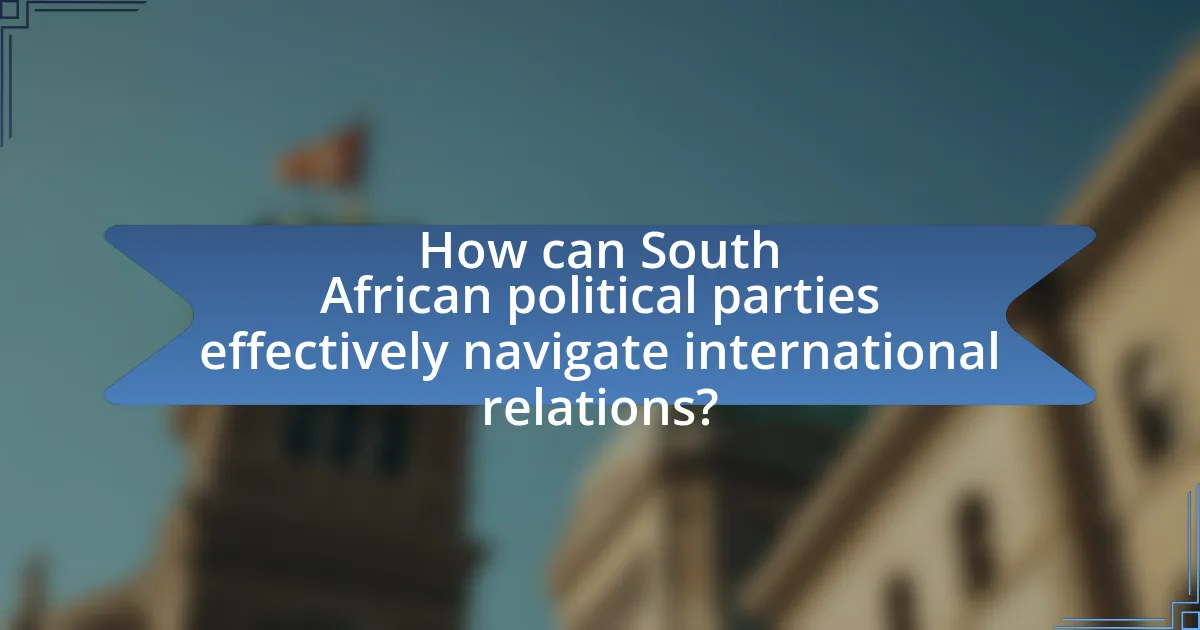
How can South African political parties effectively navigate international relations?
South African political parties can effectively navigate international relations by prioritizing strategic diplomacy, fostering multilateral partnerships, and engaging in regional cooperation. Strategic diplomacy allows these parties to articulate national interests clearly, as seen in the African National Congress’s (ANC) approach to international forums like the African Union and the United Nations, where they advocate for issues pertinent to South Africa and the African continent. Fostering multilateral partnerships enhances economic and political ties, exemplified by South Africa’s membership in BRICS, which facilitates collaboration with emerging economies. Engaging in regional cooperation, such as through the Southern African Development Community (SADC), enables political parties to address shared challenges, thereby strengthening their influence and stability in international relations.
What strategies can parties adopt to enhance their international engagement?
Political parties can enhance their international engagement by establishing strategic partnerships, participating in global forums, and leveraging technology for communication. Establishing strategic partnerships with foreign political entities allows parties to share best practices and gain insights into international political dynamics. Participation in global forums, such as the United Nations or regional organizations, provides platforms for dialogue and collaboration on shared issues, enhancing visibility and influence. Additionally, leveraging technology, including social media and virtual meetings, facilitates real-time communication and outreach, allowing parties to connect with international stakeholders effectively. These strategies are supported by the increasing trend of globalization, where interconnectedness among nations is crucial for political success.
How can political parties build stronger international coalitions?
Political parties can build stronger international coalitions by actively engaging in diplomatic dialogues, forming strategic partnerships, and participating in global forums. By establishing consistent communication channels with like-minded parties across borders, they can align their goals and share resources effectively. For instance, the African National Congress has historically collaborated with other socialist and progressive parties globally, enhancing its influence and support network. Additionally, participating in international organizations such as the United Nations or regional bodies like the African Union allows parties to advocate for shared interests and foster collaborative initiatives. This approach not only strengthens their political leverage but also promotes a unified stance on global issues, thereby solidifying their coalitions.
What best practices should parties follow in international diplomacy?
Parties should follow several best practices in international diplomacy, including effective communication, mutual respect, and adherence to international law. Effective communication ensures that all parties understand each other’s positions and concerns, which is crucial for building trust and facilitating negotiations. Mutual respect fosters a collaborative environment, allowing for the consideration of diverse perspectives and interests. Adherence to international law, such as treaties and conventions, provides a framework for diplomatic interactions and helps maintain global order. These practices are supported by historical examples, such as the successful negotiations of the Camp David Accords in 1978, where clear communication and respect for each party’s needs led to a lasting peace agreement between Egypt and Israel.
What challenges do South African political parties face in international relations?
South African political parties face significant challenges in international relations, primarily due to issues such as economic instability, historical legacies of apartheid, and varying foreign policy priorities. Economic instability, characterized by high unemployment rates and fluctuating GDP growth, complicates the ability of political parties to engage effectively on the global stage. The historical legacies of apartheid continue to influence perceptions and relationships with other nations, often leading to skepticism regarding South Africa’s commitment to human rights and democratic values. Additionally, the diverse foreign policy priorities among political parties create fragmentation, making it difficult to present a unified stance in international forums. These challenges hinder South Africa’s ability to leverage its position in global discussions and negotiations.
How can parties overcome obstacles in international negotiations?
Parties can overcome obstacles in international negotiations by employing effective communication strategies and building trust among stakeholders. Effective communication ensures that all parties clearly understand each other’s positions, interests, and concerns, which can reduce misunderstandings and foster collaboration. Building trust is essential, as it encourages openness and willingness to compromise, which are critical for successful negotiations. Historical examples, such as the negotiations that led to the end of apartheid in South Africa, demonstrate that transparent dialogue and mutual respect can facilitate agreement even in complex situations.
What common pitfalls should parties avoid in their international dealings?
Parties should avoid misunderstandings related to cultural differences in their international dealings. Misinterpretations of communication styles, negotiation tactics, and business practices can lead to conflicts and failed agreements. For instance, a study by Hofstede Insights highlights that cultural dimensions, such as individualism versus collectivism, significantly impact international business interactions. Additionally, parties must be cautious of legal and regulatory compliance issues, as failing to adhere to local laws can result in penalties or reputational damage. According to the World Bank, understanding the legal framework of a foreign market is crucial for successful international operations. Lastly, parties should steer clear of inadequate due diligence, as insufficient research on potential partners can lead to partnerships with unreliable entities, which can jeopardize business objectives.
